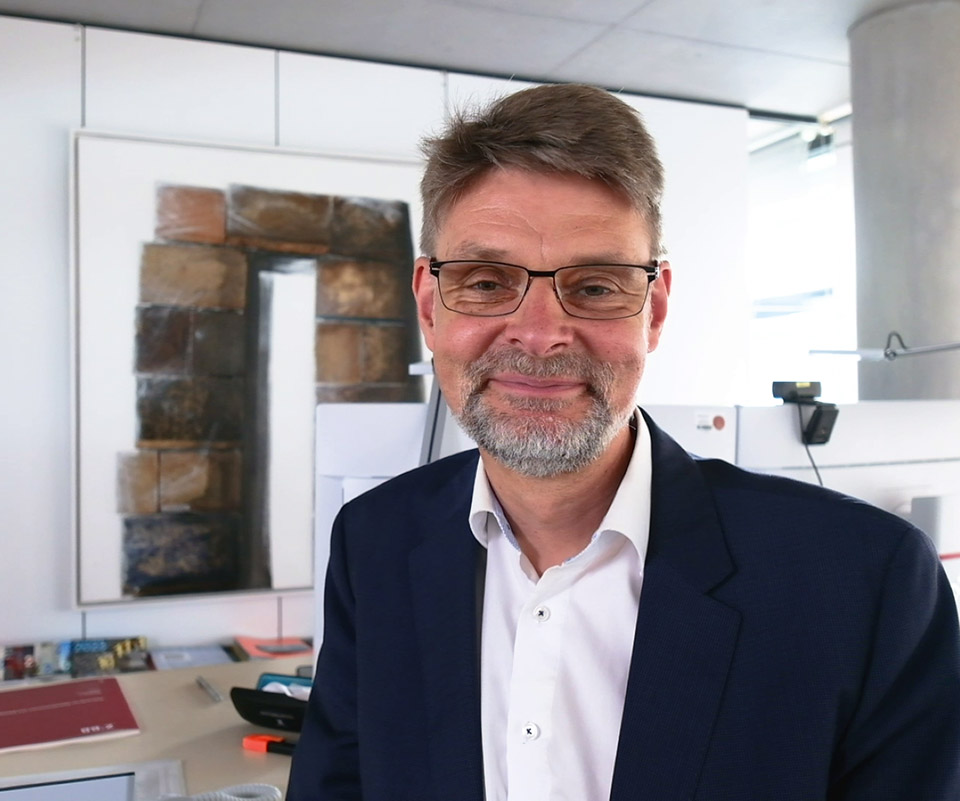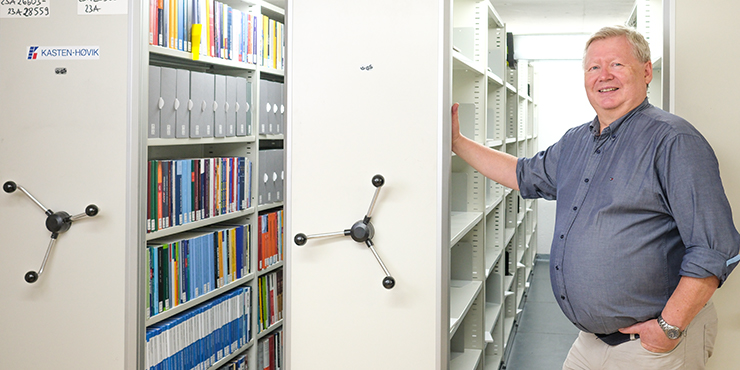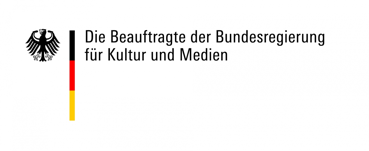Hello Mr Scholze, let's start off with a première: the first digital annual report is here! What is your frame of mind – are you happy with this development or is there also a hint of regret?
I'm absolutely delighted with this lovely new annual report. It's in touch with the times and in keeping with the German National Library's strategy of viewing everything through a digital lens. Going digital also gives us a wider reach: we can get through to more people, and our content is transported in a more pithy, focused manner than before.
In the last annual report, you expressed a desire not to have to spend so much time talking about COVID. Can we now make this wish come true?
Yes! COVID is no longer the dominant topic. But even when the COVID measures were relaxed in March 2022, things didn't immediately go back to the way they were before – and this is no longer possible in any case. Instead, 2022 saw a kind of shift to a new normal, for example with regard to home office work. Where this is concerned, we made a conscious decision to work together to find a new balance. After all, we are also a physical institution and want more encounters on site.
Do you feel that the DNB's aims could be realised more effectively if there were more physical presence?
No, I wouldn't put it like that. We did a lot of things very successfully even while the Covid restrictions were in place. But the bonding, the social cohesion, the intensive encounters – they all suffered. This is where a physical component is indispensable, and we've now gone back to working on this while giving due attention to the different tasks and individual needs within the team. In 2022, we drew up a new service agreement with a wide framework, 60 per cent of which consists of various forms of mobile working in different combinations.
While something like normality appears to be returning with regard to Covid, things we took for granted are being destroyed elsewhere. Europe is at war again. Russia invaded Ukraine in February 2022. What does this war mean for the DNB's work?
The war in Ukraine was last year's dominant theme. This is an all-inclusive war aimed at eradicating a culture – and with it the libraries, archives and museums in Ukraine. As the German National Library, we are involved on three levels: the national level, the DNB level, and the private level of our colleagues on site. At national level, the Federal Government Commissioner for Culture and Media has established a Network for the Protection of Ukrainian Cultural Assets ("Kulturgutschutz Ukraine"). Its goal is to bring all stakeholders in the cultural sector together. We at the German National Library are coordinating the library sector in cooperation with Berlin State Library.
What does this mean exactly?
We are trying to pool the requests for help from Ukrainian libraries and match them with the help offered by German libraries. It took a while to set up the logistics needed to actually get the aid to Ukraine. Meanwhile, we have found a very good partner in the Deutsch-Ukrainische Gesellschaft für Wirtschaft und Wissenschaft (German-Ukrainian Society for Business and Science), which is helping us provide aid on site. We have been able to send several consignments of packaging material, computer technology and scanners to Ukraine, especially to Kyiv and the Rivne region.
What is happening on the second level you mentioned?
At DNB level, we very soon turned our attention to those of our holdings connected with Ukraine and to German translations of Ukrainian literature. We have bundled a large quantity of information about Ukrainian culture on our website in order to make it more widely known. We have also awarded a number of fellowships to Ukrainian colleagues so that we can give material assistance to refugees right here. In 2022, we awarded four fellowships for librarians from our own funds and two for authors from additional funds provided by the Federal Government Commissioner for Culture and Media.
That sounds like a lot of work; did your colleagues do all of this in addition to their regular workload?
Yes, our colleagues at the DNB are highly motivated with a strong sense of responsibility, and they actually did this on top of everything else – they showed their commitment at national level, looked after fellowship holders at DNB level, and played an active part in refugee aid at a personal level, for example by organising open cafés, giving language lessons or facilitating access to medical care.
The dedication of DNB staff brings us neatly to another première: the DNB's first hackathon. What can you tell us about this project?
It was an initiative started by our staff. We are very fortunate to have a number of staff who are familiar with hackathons. They formed a small project team and organised the entire process. A hackathon is an opportunity for everyone to pitch ideas and persuade people to work on them. If enough people get behind an idea, they can spend two days working on it and thus make advances in the respective area. The results are presented at the end.
And the Director-General had nothing to do with it?
The Director-General's support was important inasmuch as we placed the necessary working hours at the disposal of the colleagues involved. However, this wasn't a strategic decision by the Director-General; instead, the question came from the bottom up: how can we on the inside be dynamic and agile, what can we do on site to benefit the DNB? The hackathon is a really good format in this respect since it brings up exactly the topics that are on people's minds. I believe it was very valuable for our working atmosphere, our sense of camaraderie, our interactions and dialogue.
Now let's come to the current Strategic Priorities until 2024. Perhaps you can take stock of developments so far: what is your conclusion?
At the halfway point in 2022, we can already say that we have set ourselves a lot of goals that will take us beyond the current strategy cycle – this even applies to the basic statement that we want to be able to offer permanent digital access to all our collections. Overall, however, the Strategic Priorities are important for creating joint descriptions of the avenues we are pursuing. The most important keywords in this respect are digitisation, automation and cooperation. We accomplished a great deal in 2022 and have opened access to an incredibly large volume of tables of contents and digital objects.
What does this look like in actual figures?
Every year, I think we have to spend a little time practising being satisfied with what we have accomplished. We have to push ourselves while celebrating what we have achieved.
So what did you achieve last year in terms of employer branding?
Employer branding was and still is a key topic. We have to keep on coming back to the questions: how can we remain attractive as an organisation? How can we make ourselves appealing on the outside, what stories do we tell? There is for example a lot of lively discussion about good framework conditions such as the various forms of mobile working we've already talked about. We also invest a lot in professional development and training; our management staff in particular are called upon to act as multipliers for satisfaction and motivation. What's more, we offer rotation programmes with other libraries, not least with Berlin State Library and the Bavarian State Library.
And what kind of staff will be needed in the future? Will we be seeing more and more computer scientists as the shift towards digitisation continues?
I believe that digitality and digitisation entail a blurring of boundaries or greater infiltration. That means you can't stay in some limited "comfort zone" within your sphere of competence, because the links that bind everything together are becoming tighter all the time. We need people in all areas who are willing and keen to keep on developing and get to grips with IT issues, technical systems, dependencies and processes – these people could be librarians, book dealers, media designers, humanities experts or people with other professional backgrounds.
You've already found at least one person who's keen to do this: in 2022, the DNB made an important personnel-related decision.
Exactly, another personal highlight of last year: we have chosen a successor to Michael Fernau, my permanent representative at the Leipzig location. After an intensive selection process consisting of multiple rounds, we decided to appoint Johannes Neuer, who will take up his new post on 1 August 2023.
Is there another highlight from last year that you'd like to finish with?
For me personally and the DNB in general, one of the most important developments last year was that we were able to move the plans for our fifth extension at the Leipzig location into the next phase. In technical terms, this means we are now preparing the "initial project document" for the architectural competition that will give the project a concrete form. This is an important milestone for us, because for all the advances being made in digitisation, we will continue collecting physical media for the foreseeable future.
Last changes:
19.09.2023







